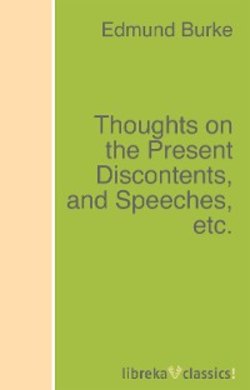Thoughts on the Present Discontents, and Speeches, etc.

Реклама. ООО «ЛитРес», ИНН: 7719571260.
Отрывок из книги
Transcribed from the 1886 Cassell & Company edition by David Price, email ccx074@pglaf.org and proofing by David, Terry L. Jeffress, Edgar A. Howard.
EDMUND BURKE.
.....
Court influence was strengthened in those days by the large number of newly-rich men, who bought their way into the House of Commons for personal reasons and could easily be attached to the King’s party. In a population of 8,000,000 there were then but 160,000 electors, mostly nominal. The great land-owners generally held the counties. When two great houses disputed the county of York, the election lasted fourteen days, and the costs, chiefly in bribery, were said to have reached three hundred thousand pounds. Many seats in Parliament were regarded as hereditary possessions, which could be let at rental, or to which the nominations could be sold. Town corporations often let, to the highest bidders, seats in Parliament, for the benefit of the town funds. The election of John Wilkes for Middlesex, in 1768, was taken as a triumph of the people. The King and his ministers then brought the House of Commons into conflict with the freeholders of Westminster. Discontent became active and general. “Junius” began, in his letters, to attack boldly the King’s friends, and into the midst of the discontent was thrown a message from the Crown asking for half a million, to make good a shortcoming in the Civil List. Men asked in vain what had been done with the lost money. Confusion at home was increased by the great conflict with the American colonies; discontents, ever present, were colonial as well as home. In such a time Burke endeavoured to show by what pilotage he would have men weather the storm.
H. M.
.....